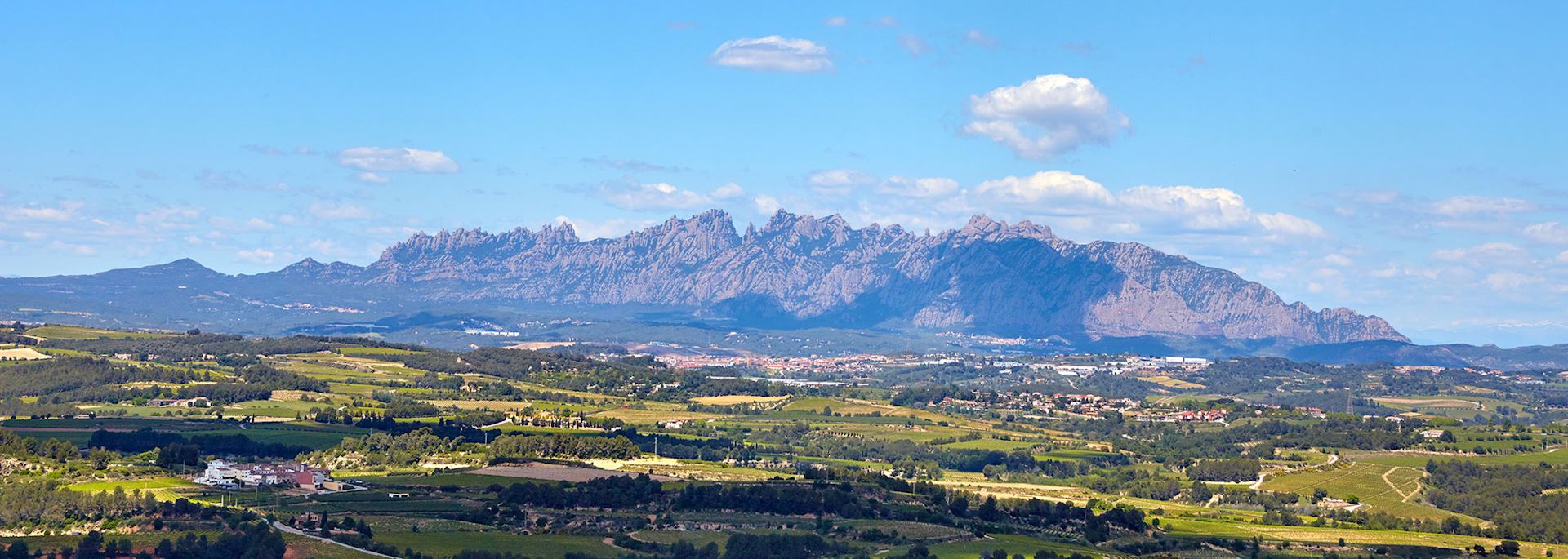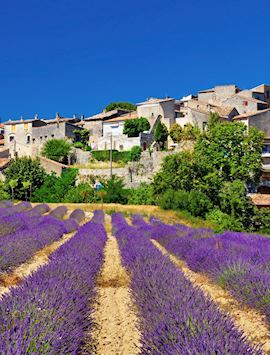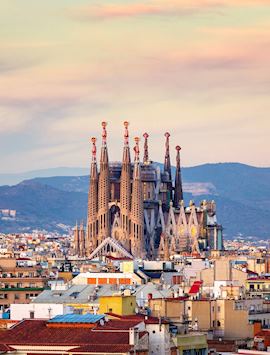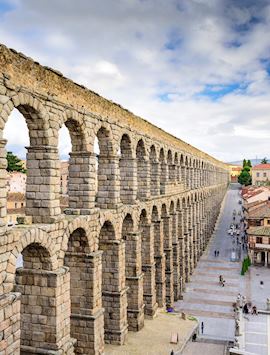Jump to:
Backed by bulbous, fingerlike rock formations that for all the world seem to point up to the heavens, the Monestir de Montserrat (Montserrat Monastery) has been the chief pilgrimage destination for Catalans over the past 1,000 years. Set in an eyrie high in the Montserrat mountain range, you can comfortably visit the monastery in a day’s outing from Barcelona.
It takes an hour’s car journey, heading northeast inland, to reach the monastery, which rests on a plateau close to the summit of Montserrat mountain, the highest peak in range. One of the most striking parts of any visit here are the panoramic views. Arriving up the steep hillside you are greeting with a dramatic vista across the plains below and beyond to the Penedès, the home of Spain’s cava wine production.
 The austere, fortress-like abbey buildings hide the basilica of Santa Maria de Montserrat in a courtyard within the complex. In turn, its Gothic-meets-Renaissance interior focuses reverentially around the wooden sculpture of the Virgin Mary, known as La Moreneta (the Black Virgin), a symbol of Catalan nationalism.
The austere, fortress-like abbey buildings hide the basilica of Santa Maria de Montserrat in a courtyard within the complex. In turn, its Gothic-meets-Renaissance interior focuses reverentially around the wooden sculpture of the Virgin Mary, known as La Moreneta (the Black Virgin), a symbol of Catalan nationalism.
The seated 1 m (3 ft) figure is elevated in a niche above the altar, sandwiched between silver relief panels and protected by a curved wall of glass. Many stories surround La Moreneta, including how she was carved by Saint Luke himself and of her discovery in a nearby cave in 880 AD, but carbon dating has placed her as a 12th-century relic. The statue is darkened, rather than black, the result of age and candle smoke.
A circular cutout in La Moreneta’s glass encasement allows pilgrims to touch the orb she holds in her right hand. Tradition tells you to place one hand on the ball and raise the other up in acceptance of Jesus Christ. It’s a popular custom for newly married couples in particular to seek La Moreneta’s blessing.
If you want to join the procession of those who come to stand in front of La Moreneta for their private moment of contemplation, we advise to check ahead as access is closed at certain times.
With roots back to the 1200s, the Escolania is Montserrat’s boys’ choir. All the 50 or so choristers hail from Catalonia, and you can hear them sing their specific style of counterpoint and Gregorian chanting in the setting of the basilica during two daily performances at 1pm and 6:45pm.
The monastery also has its own art collection, contained within the Museum of Montserrat. The works span the antique and modern across painting, sculpture and archaeological finds. European masters such as El Greco, Caravaggio, Degas and Picasso are all represented along with pre-eminent Catalan artists, including landscapist Joaquim Vayreda and portraitist Ramon Casas.
Napoleon’s armies sacked the buildings in 1811 after wrestling them from the Spanish, but the monks came back in the 1850s to re-establish Catalonia’s spiritual heart. A taciturn community of about 50 Benedictine monks (who stay hidden away) still live at the monastery. They continue to observe Montserrat’s traditions, setting their lives to the motto of Saint Benedict, ‘Ora et labora’ (‘Pray and work’).
The order opens the monastery’s doors to all visitors, irrespective of whether you’re there for the spirituality, the sense of history, the architecture or the views. They also find time to be enterprising, marketing their own range of liqueurs to visitors in the shop (funds are siphoned back into the community).
Best time to visit Montserrat
Montserrat’s mountain setting ensures cooler weather than is usual for Catalonia. If you journey up from Barcelona, you should feel a drop in temperature as you climb in altitude. The temperatures peak in July and August, but so do the crowds coming to worship or generally visit. We recommend visiting Montserrat either side of this time, from May to June or in September, when the monastery still basks under blue skies and sunshine. October is typically the wettest month, and the winter brings near freezing conditions and the possibility of snow.
who's been there
- 617-223-4767
- Make an inquiry
Suggested itineraries featuring Montserrat
Our itineraries will give you suggestions for what is possible when you travel in Montserrat, and they showcase routes we know work particularly well. Treat them as inspiration, because your trip will be created uniquely by one of our specialists.
Places near Montserrat
- Catalonia 27 kilometers away
- Cava wine region 31 kilometers away
- Barcelona 37 kilometers away
- Girona 93 kilometers away
- Palma 236 kilometers away
- Mallorca 236 kilometers away
- The Balearic Islands 242 kilometers away
- Menorca 259 kilometers away
- Ibiza 301 kilometers away
- San Sebastián 368 kilometers away
- La Rioja 371 kilometers away
- The Basque Country and La Rioja 430 kilometers away
- Bilbao 434 kilometers away




